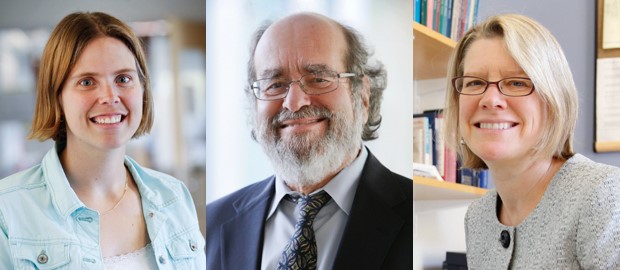Brandeis receives $1 million grant to boost science education
A portion of the funds will go toward supporting talented, underrepresented students. New, smaller classes will be offered alongside introductory courses.
 Photos: Mike Lovett
Photos: Mike LovettProfessor of Biology Melissa Kosinski-Collins, Henry F. Fischbach Professor of Chemistry Irving Epstein and Associate Provost for Academic Affairs Kim Godsoe.
Brandeis has been awarded a $1 million, 5-year grant from The Howard Hughes Medical Institute (HHMI) to increase institutional capacity for fostering the success of students from all backgrounds in science.
The funding propels the university into the front ranks of educational institutions working to diversify the so-called STEM fields — science, technology, engineering and mathematics. The grant will provide resources and support to undergraduates, particularly students of color, those from a low-income background, first-generation college students and military veterans.
“We are missing a whole segment of the population with a huge amount of talent.”
Over time, many of the HHMI-funded initiatives will be available to all Brandeis undergraduates in an effort to boost the overall retention of students in STEM fields. Nationally, only 48 percent of undergraduates who start out in STEM graduate in one of those majors.
"We are among the handful of schools that are taking important and innovative steps to enhance student success in STEM," says Henry F. Fischbach Professor of Chemistry Irving Epstein, who wrote the winning grant proposal with Associate Provost for Academic Affairs Kim Godsoe and Professor of Biology Melissa Kosinski-Collins.
Brandeis is one of 33 institutions of higher education that received the HHMI Inclusive Excellence award this year. “This initiative is about encouraging colleges and universities to change the way they do business — to become institutions with a significantly greater capacity for inclusion of all students, especially those from non-traditional backgrounds,” says Erin O’Shea, HHMI’s president.
Brandeis will use some of the funding to build on the success of its Science Posse program, which was started 12 years ago to attract and retain talented, underrepresented students in college-level science. Science Posse originated at Brandeis as a joint effort between the university, HHMI and the New York-based Posse Foundation, started by Deborah Bial '87. Hailed as a success, the program has been adopted by 11 other colleges.
“If you look at some of the most esteemed professionals — professors, doctors and researchers — they come from families who are overwhelmingly white, college-educated and middle or upper middle class,” says Godsoe. “We are missing a whole segment of the population with a huge amount of talent.”
The Galaxy Program
Some of the HHMI Inclusive Excellence grant will support the Galaxy Program, an initiative in which 60 students, many from underrepresented or disadvantaged groups, will be mentored by faculty, postdocs and graduate students and offered additional instruction.
Students in the Galaxy program will divide into small clusters and participate in additional weekly classes linked to the introductory biology, chemistry or physics lecture courses they take. "This approach is intended to counter the anonymity of big lecture classes,” says Kosinski-Collins. “We’re taking that large, anonymous experience and making it more tangible, so they feel more engaged.”
Culture change
Epstein and his colleagues believe the grant will also help change the “sink or swim” culture in science education that favors students who have benefited from excellent high school preparation. Some students who arrive less academically prepared or want to pursue non-academic careers in the health sciences or industry can feel discouraged and wind up switching majors.
To counter this trend, the Galaxy program and a newly designed faculty workshop/discussion group will help faculty to give students the support they need to reach their potential, even when they come from different academic starting points and learn at different rates.
For their part, students will discuss the challenges they face in STEM, such as “imposter syndrome,” where they doubt their talent and worry about being exposed as frauds. They will read about “stereotype threat,” where the assumptions and generalizations of others can negatively affect one’s self-identity and performance. “It’s talking about it, making students aware that this can happen,” says Kosinski-Collins. “There’s no reason these students should feel that they’re not as smart and capable as everyone around them.”
Professor of Biology and Environmental Studies Dan Perlman and Assistant Professor of Education and Sociology Derron Wallace will also be involved in administering the grant.
Categories: Research, Science and Technology





